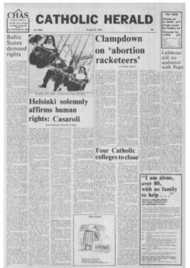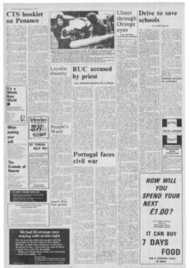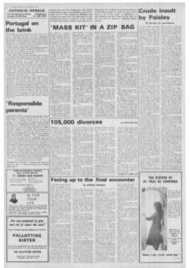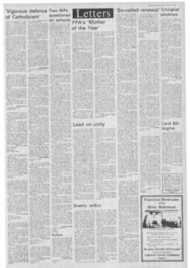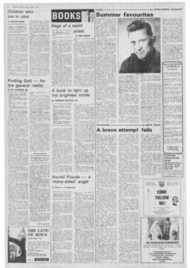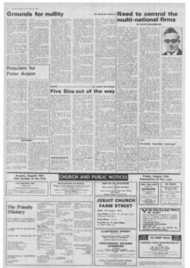Page 4, 8th August 1975
Page 4
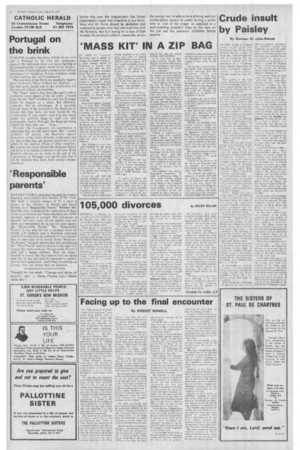
Report an error
Noticed an error on this page?If you've noticed an error in this article please click here to report it.
Tags
Share
Related articles
/ng Sen0 —
Heresy And Error In This Stevas Plum Pudding
Two Techniques To Get People Singing In Church
Abortion Law
Human Life
Crude insult by Paisley
By Norman St John-Stevas
AS THE month of August comes round again and Parliament rises for the long Summer Recess I begin to think that I should start the task of preparing for my memoirs which will he published in a Victorian three Volume edition like an early nineteenth century novel -containing, however, more fact than fiction.
One section of the first volume will be devoted to Oxford and Cambridge, since I am in the unusual although not unique position of having been an undergraduate at both.
Maurice Baring enjoyed the same privilege, but in the essay he wrote on the subject which can be found buried in the collected edition or his works he took the line that really they were not so very different, that what they shared in common was \Try much more important than where they differed.
I believe this to be a dubious thesis is!' itself, and in any case it makes for dull reading. Of course there are similarities: as
wrote as an undergraduate many years ago: "An ancient tradition of centuries is shared by both, and the baleful threat of modern scientific education is equally felt.
"Scientists throng Kings Parade as much as they do the High, They scuttle into lahoriliories by day and out again by night, Rigid requirements of work, overloaded syllabuses, endless and mysterious experiments preclude them from the more genial activities of university life. They form. a vast, silent, coffee-drinking mass!" Poor scientists: I think I would he rather less scornful today.
Yet if similarities there are, the differences are deeper marked. Cambridge is a matterof-fact. down-to-earth, sensible universits.,, still defiantly progressive and somewhat less defiantly Protestant.
Oxford, despite the unfortunate impact of Lord Nuffield is still very much the City of Dreaming Spires, the home of lost causes and impossible loyalties, Catholic and conservative. in its deepest roots. The Oxford Movement could never have come from Cambridge.
Is Oxford more beautiful than Cambridge? The question is una nsw erable. Oxford is an architectural treasury of the Middle Ages: Magdalen with its slender lower, shady cloisters and stately deer-park, is an enchantment; the grandeur of Christ Church Hall and Toni Quad, the eighteenth century magnificence of Peckwater could hardly be surpassed.
Yet there is nothing to equal the loveliness of the Backs at Cambridge in the height of summer. the nobility of King's College chapel or the elegant and perfectly proportioned Senate House. Architecturally Cambridge is to Oxford what Paris is to Rome.
In Cambridge, as in Paris. everything is on show and the whole is laid out to the best advantage. Oxford, like Rome, abounds in beauty, but it is a
sought for.
that must be
s
Both Oxford and Cambridge are graced by the Union
debating societies, founded in the nineteenth century with Cambridge the senior by a short head, I recall many debates of particular Catholic interest, the first being one on birth Control, arranged by myself at Cambridge as vice-president, to which I invited Dr Norman Maire, a well known sexologist of the period and Bishop George Andrew Beck, then Coadjutor of Brentwood.
I introduced them as being both distinguished m en "although for somewhat different reasons." The birth controllers carried the day despite a passionate plea by your columnist to "populate or perish, increase and multiply or vanish for ever into the dust of the civilisations of the past."
Later, when I became president I entertained another charming and erudite episcopal guest, Archbishop Downey of Liverpool. whom I besought to appear in purple robes, but he declined saying that he always wore gaiters in Partibus infidelium. Theologically he may have had a point, but aesthetically they did not do much for his somewhat rotund lip re !
The subject of the debate was Church schools, and the Archbishop was supported by the unlikely -person of Mr Osbert Lancaster and opposed by none otherthan the great Professor Thad.
recall Dr Downey's nsot — he was a great wit — about agreed-syllabus religiose "The religion of nobody, taught by anybody, and paid for by everybody." The motion calling for increased aid to Church schools was carried by a large . majority, and the teller for the -ayes" was none other than our beloved Mr Richard Cunningham, now secretary of the Catholic Education Council.
Perhaps the most famous debate of all on religion was that which took place at the Oxford Union some years ago between myself and the Rev Ian Paisley which was televised by the BBC.
In the course of his onslaught OIL the Church, Mr Paisley held up a Host and intoned: "Roman Catholics believe that this becomes the Body, Blood and Bones of Christ" — and dropped it on the floor.
13y this crude insult he lost the sympapy of the entire audience and the motion in favour of the Catholic Church was carried by a record maiorits The debate earned its niche in history since it was the First time that the British public in general realised effectively what Catholics had to put up with in Northern Ireland from their extremist opponents.
Whenever people tell me how "moderate" and how "statesmanlike" Mr Paisley has become my mind goes back to that disgraceful and horrible incident at the Union. The style, after all, is the man.
I still enjoy returning to the Unions and to hear at first hand the young men (and now women) of the future going through their paces. They seem to me every bit as promising as their predecessors, and nothing is a better cure for a fit of depression about the future of Britain than to take part for an evening in the activities of the Oxford and Cambridge Unions.
blog comments powered by Disqus


